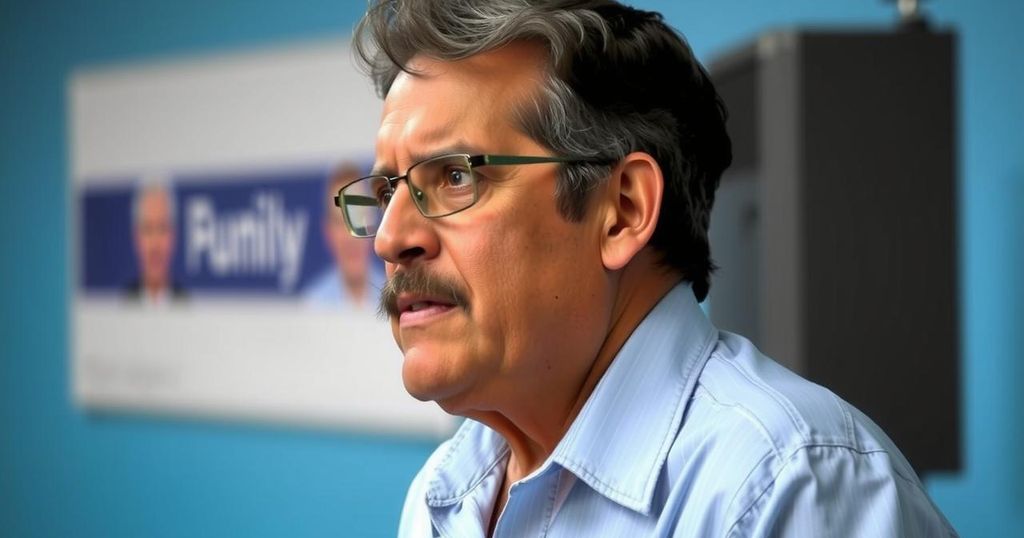Politics
AMERICAS, CARLOS JORNET, COMMITTEE, CUBA, DANIEL ORTEGA, DEMOCRACY, FREEDOM OF, GUSTAVO PORRAS, HUMAN RIGHTS, INTER AMERICAN ASSOCIATION, JORNET, JUDICIAL REFORM, MU, MURILLO, NATIONAL SECURITY, NICARAGUA, NICARAGUA NEVER AGAIN HUMAN RIGHTS COLLECTIVE, NORTH AMERICA, OPPOSITION, ORTEGA, REUTERS, ROSARIO MURILLO, SOUTH AMERICA, UNITED STATES, VENEZUELA, VOA
Marcus Li
0 Comments
Nicaragua’s Constitutional Reforms: A Step Towards Authoritarian Control
Nicaragua’s proposed constitutional reforms will expand state control over media and increase presidential power, mirroring authoritarian tactics seen in Cuba and Venezuela. Critics warn that these measures threaten free expression and independent journalism, amid concerns over human rights abuses under President Daniel Ortega’s regime.
Nicaragua is poised to endorse significant constitutional reforms in January, elevating state influence over media and expanding presidential authority. If approved, the new regulations would empower the government to regulate media outlets and restrict content deemed to contradict national interests or spread misinformation. This strategy mirrors tactics employed by authoritarian regimes in nations such as Cuba and Venezuela, as it aims to suppress free speech and independent journalism, a trend concerning freedom advocates across the region.
President Daniel Ortega’s reform initiatives, which also include extending his presidential term from five to six years and designating his wife, Rosario Murillo, as “co-president,” serve to consolidate power further. Reports indicate that such actions have already led to the persecution and exile of numerous journalists, as Ortega’s regime seeks to silence dissenting voices more aggressively. Human rights organizations estimate severe abuses, including over 200 political prisoners and widespread arrests linked to anti-government protests in recent years.
Analysts emphasize the dangerous implications of these reforms, as they not only threaten media independence in Nicaragua but also reflect a troubling pattern of governance that stifles opposition across Latin America. Lucia Pineda Ubau of 100% Noticias remarked on the reforms’ chilling effect on independent journalism, stating that they effectively criminalize dissent and further infringe upon freedom of expression, especially through the newly proposed penalties for disseminating false information.
Global advocates for human rights have reacted with alarm, perceiving this constitutional change as a step towards irreversible authoritarianism. Experts note parallels with similar legislative measures in Cuba, where repressive laws regulate online expression and impose harsh penalties for dissent. In light of these developments, the United Nations has condemned Nicaragua’s impending reforms as a direct affront to fundamental freedoms and the rule of law, predicting dire consequences for civil liberties in the country.
The impending constitutional reforms in Nicaragua highlight a broader trend of media suppression in several authoritarian regimes, especially in Latin America. The proposed changes reflect styles of governance that prioritize state control over individual rights and freedoms. The situation evidences a growing global pattern where governments diminish independent journalism and civil discourse under the pretext of regulating misinformation, impacting the vigor of democratic institutions and the rule of law.
The proposed constitutional reforms in Nicaragua exemplify a concerning global trend toward authoritarianism, where free speech and independent media are systematically undermined. Such changes not only bolster the Ortega regime’s grip on power but also echo similar repressive measures seen in Cuba and Venezuela. With widespread condemnation from human rights organizations and experts, the unfolding situation demands urgent international attention to safeguard democratic ideals in Nicaragua and beyond.
Original Source: www.voanews.com




Post Comment